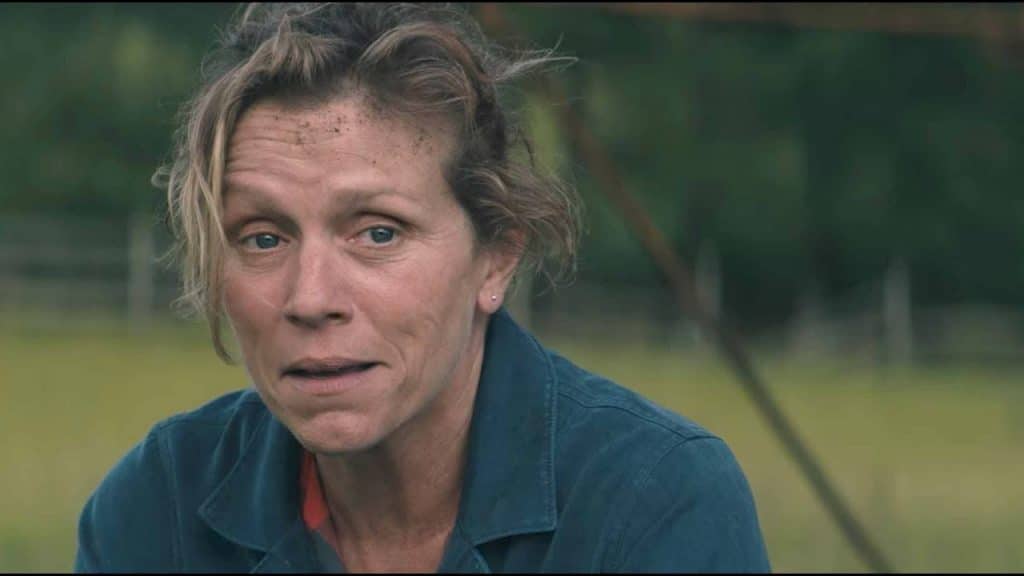Relying on a wonderful cast, McDonagh creates a film full of compassion about lost characters struggling to find meaning for their wrecked existences
Three Billboards Outside Ebbing, Missouri (2017)
Written and directed by Martin McDonagh. Starring Frances McDormand, Woody Harrelson, Sam Rockwell, John Hawkes, Peter Dinklage, Abbie Cornish, Caleb Landry Jones, Kerry Condon, Darrell Britt-Gibson, Lucas Hedges, Željko Ivanek, Amanda Warren, Kathryn Newton, Samara Weaving and Clarke Peters.
Manichaeism is such an easy thing to resort to when you make a film. Ever since the old days of Hollywood and the consolidation of genres in Cinema, the most basic trick in the book is to tell stories about good heroes fighting evil villains as if the world is essentially divided between these two groups of people. This, of course, has been mainly done for political reasons, in order to simplify matters and depersonalize antagonists, but it doesn’t mean you cannot find authors who understand that there is a huge grey area in between — although even today we see lazy writers and directors who give in to this kind of one-dimensional dualism, quickly identifying the Enemy and barely giving them the chance to be anything more than just plain evil.
It is for reasons such as those that I am always genuinely surprised when I encounter a film so full of character nuances like Three Billboards Outside Ebbing, Missouri, in which you can find abusive ex-husbands and racist cops that are more human than probably all John Wayne’s characters combined. Written and directed by Martin McDonagh (In Bruges, Seven Psychopaths), it tells the story of Mildred Hayes (Frances McDormand), who after several months and no culprit found in her daughter’s brutal murder case, puts up three billboards outside her town of Ebbing, Missouri to publicly accuse Sheriff William Willoughby (Woody Harrelson) of not doing anything to catch the killer — a move that is seen by most people in town as a tremendous injustice.
Willoughby is loved by everyone and his fellow cops, including the immature and violent Jason Dixon (Sam Rockwell), who is known for torturing black people — “persons of color-torturing,” as the idiot says. What those characters have in common is how tortured they are. Willoughby, for instance, is a tough man who wants to hide his vulnerability and the tragic fact that he is dying, even though everyone in town knows. Harrelson does a fantastic job shaping a flawed but good character who may be lenient with the racism among cops and yet is absolutely sensible when enumerating the limitations of a police investigation. We can see torment and love in his eyes, and it takes a great actor to make “you lazy bitch” sound so affectionate.
Mildred, in turn, is an embittered woman who has managed to live through an abusive marriage and is now doing whatever she can to hold herself together after an awful tragedy. She tries not to care about what people think of her (she even assaults some kids without a second thought), and McDormand shines by letting us see Mildred’s heart beneath so much resentment, like in a beautiful scene in which she opens up to a passing deer. While we understand Mildred from the way her son and ex-husband speak of her (usually as a “cunt”), we learn that even her daughter wanted to move in with her father to get away from her. It is not the murder that shaped Mildred to be this way, she was already like that before, dry and broken.
And if her ex-husband Charlie (John Hawkes, excellent) surprises us with a shocking moment of tenderness towards her, Dixon is the most fascinating character in the entire film, a simple-minded and lost man who carries a world of anger inside him without realizing why — and Rockwell deserves a lot of praise for making us pity a character who could have been easily made into an odious creature. Dixon’s violent explosion of hate (shot in a magnificent long take) comes from a place of loss, pain, frustration, and a desperate need to blame someone — and I really doubt we will see this year another scene so full of sorrow and compassion like the one that takes place between Dixon and another character in a hospital room.
Benefiting from an evocative Western-like score by Carter Burwell (Fargo, No Country for Old Men), Three Billboards Outside Ebbing, Missouri deconstructs genre conventions (think of the Coen brothers) and finds a perfect tonal balance between humor and drama, with moments ranging from snappy (like Mildred’s ferocious monologue about culpability) to bizarre (Mildred drilling a hole into someone’s thumbnail) or surreal (like when Charlie’s 19-year-old girlfriend interrupts a fight to talk about a job at the zoo). The dialogue, in fact, reaches many times the point of nonsensical, with hilarious lines such as “Nobody cares about dentists” and zany discussions like Dixon demanding an explanation from the men who erect the billboards.
But while McDonagh seems to be having a lot of fun with those offbeat conversations about the “importance of English” (“unless you’re Mexican”) or an elusive “sandy country,” it is clear that he is more interested in telling a sincere story about love and how essential it is in a world full of hate. There is one scene that illustrates that quite well, when Mildred and Willoughby indulge in a bitter exchange of barbs and an incident completely changes the tone of the conversation, making it clear for us that these are good people whose anger comes from ugly circumstances. And that is why a certain decision in the end reveals so much about these characters, who need to find a meaning for their lost lives without any conviction about where they are going.





